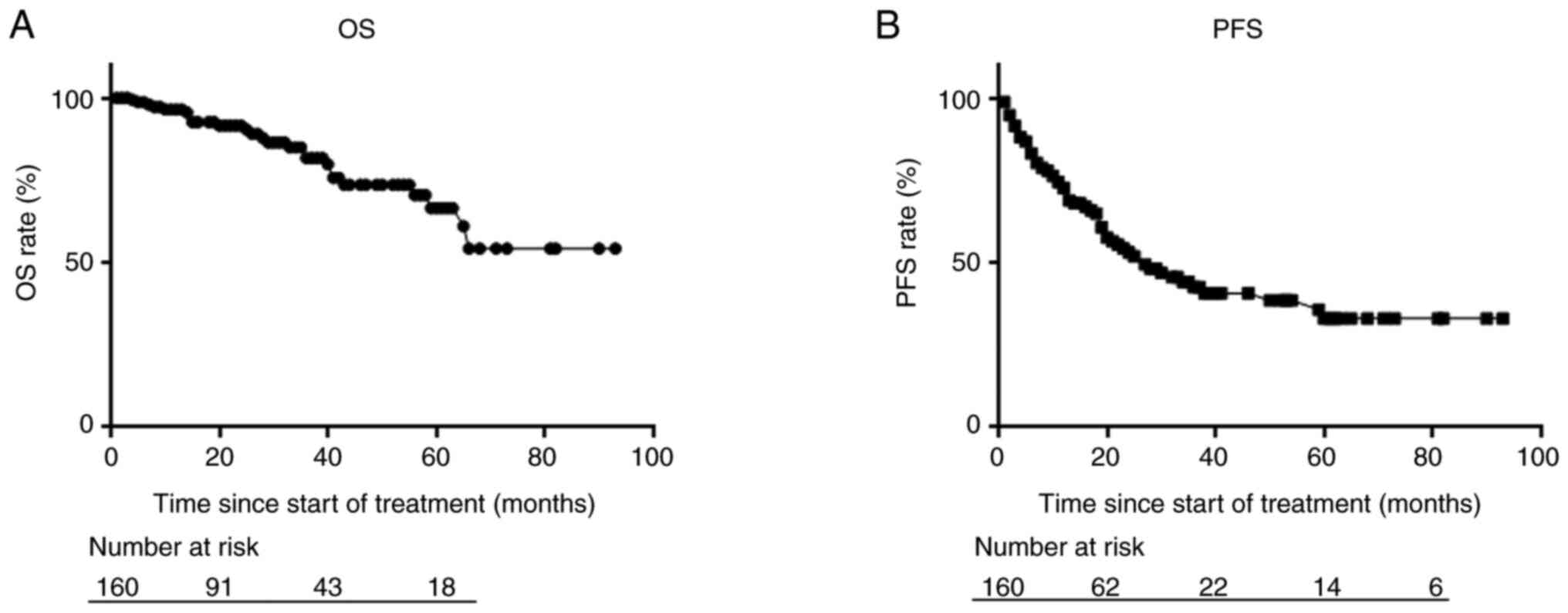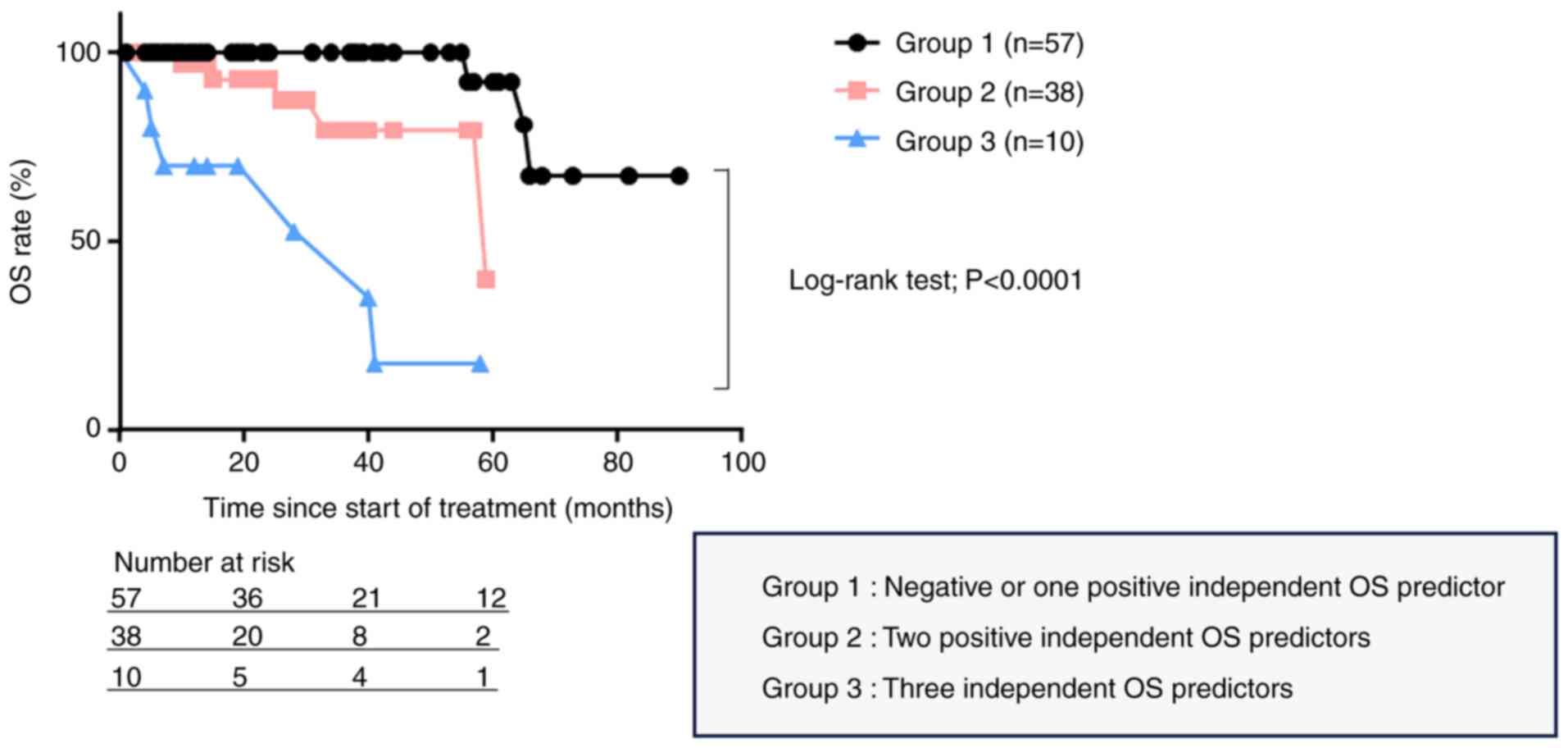|
1
|
Paller CJ and Antonarakis ES: Management
of biochemically recurrent prostate cancer after local therapy:
Evolving standards of care and new directions. Clin Adv Hematol
Oncol. 11:14–23. 2013.PubMed/NCBI
|
|
2
|
Antonarakis ES, Feng Z, Trock BJ,
Humphreys EB, Carducci MA, Partin AW, Walsh PC and Eisenberger MA:
The natural history of metastatic progression in men with
prostate-specific antigen recurrence after radical prostatectomy:
Long-term follow-up. BJU Int. 109:32–39. 2012.PubMed/NCBI View Article : Google Scholar
|
|
3
|
Scher HI, Morris MJ, Stadler WM, Higano C,
Basch E, Fizazi K, Antonarakis ES, Beer TM, Carducci MA, Chi KN, et
al: Trial design and objectives for castration-resistant prostate
cancer: Updated recommendations from the prostate cancer clinical
trials working group 3. J Clin Oncol. 34:1402–1418. 2016.PubMed/NCBI View Article : Google Scholar
|
|
4
|
Fizazi K, Shore N, Tammela TL, Ulys A,
Vjaters E, Polyakov S, Jievaltas M, Luz M, Alekseev B, Kuss I, et
al: Nonmetastatic, castration-resistant prostate cancer and
survival with darolutamide. N Engl J Med. 383:1040–1049.
2020.PubMed/NCBI View Article : Google Scholar
|
|
5
|
Smith MR, Saad F, Chowdhury S, Oudard S,
Hadaschik BA, Graff JN, Olmos D, Mainwaring PN, Lee JY, Uemura H,
et al: Apalutamide treatment and metastasis-free survival in
prostate cancer. N Engl J Med. 378:1408–1418. 2018.PubMed/NCBI View Article : Google Scholar
|
|
6
|
Sternberg CN, Fizazi K, Saad F, Shore ND,
De Giorgi U, Penson DF, Ferreira U, Efstathiou E, Madziarska K,
Kolinsky MP, et al: Enzalutamide and survival in nonmetastatic,
castration-resistant prostate cancer. N Engl J Med. 382:2197–206.
2020.PubMed/NCBI View Article : Google Scholar
|
|
7
|
Ryan CJ, Crawford ED, Shore ND, Underwood
W III, Taplin ME, Londhe A, Francis PSJ, Phillips J, McGowan T and
Kantoff PW: The IMAAGEN study: effect of abiraterone acetate and
prednisone on prostate specific antigen and radiographic disease
progression in patients with nonmetastatic castration resistant
prostate cancer. J Urol. 200:344–352. 2018.PubMed/NCBI View Article : Google Scholar
|
|
8
|
Esther J, Maughan BL, Anderson N, Agarwal
N and Hahn AW: Management of nonmetastatic castration-resistant
prostate cancer: Recent advances and future direction. Curr Treat
Options Oncol. 20(14)2019.PubMed/NCBI View Article : Google Scholar
|
|
9
|
Bouillanne O, Morineau G, Dupont C,
Coulombel I, Vincent JP, Nicolis I, Benazeth S, Cynober L and
Aussel C: Geriatric nutritional risk index: A new index for
evaluating at-risk elderly medical patients. Am J Clin Nutr.
82:777–783. 2005.PubMed/NCBI View Article : Google Scholar
|
|
10
|
Buyyounouski MK, Choyke PL, McKenney JK,
Sartor O, Sandler HM, Amin MB, Kattan MW and Lin DW: Prostate
cancer-major changes in the American joint committee on cancer
eighth edition cancer staging manual. CA Cancer J Clin. 67:245–253.
2017.PubMed/NCBI View Article : Google Scholar
|
|
11
|
Lodde M, Lacombe L and Fradet Y: Salvage
therapy with bicalutamide 150 mg in nonmetastatic
castration-resistant prostate cancer. Urology. 76:1189–1193.
2010.PubMed/NCBI View Article : Google Scholar
|
|
12
|
Sartor AO, Tangen CM, Hussain MH,
Eisenberger MA, Parab M, Fontana JA, Chapman RA, Mills GM, Raghavan
D and Crawford ED: Southwest Oncology Group. Antiandrogen
withdrawal in castrate-refractory prostate cancer: A southwest
oncology group trial (SWOG 9426). Cancer. 112:2393–2400.
2008.PubMed/NCBI View Article : Google Scholar
|
|
13
|
Suzuki H, Okihara K, Miyake H, Fujisawa M,
Miyoshi S, Matsumoto T, Fujii M, Takihana Y, Usui T, Matsuda T, et
al: Alternative nonsteroidal antiandrogen therapy for advanced
prostate cancer that relapsed after initial maximum androgen
blockade. J Urol. 180:921–927. 2008.PubMed/NCBI View Article : Google Scholar
|
|
14
|
Tombal B, Sternberg CN, Hussain M, Ganguli
A, Li Y, Sandin R, Bhadauria H, Oh M and Saad F: Matching-adjusted
indirect treatment comparison of the efficacy of enzalutamide
versus apalutamide for the treatment of nonmetastatic
castration-resistant prostate cancer. ESMO Open.
7(100510)2022.PubMed/NCBI View Article : Google Scholar
|
|
15
|
Smith MR, Saad F, Chowdhury S, Oudard S,
Hadaschik BA, Graff JN, Olmos D, Mainwaring PN, Lee JY, Uemura H,
et al: Apalutamide and overall survival in prostate cancer. Eur
Urol. 79:150–158. 2021.PubMed/NCBI View Article : Google Scholar
|
|
16
|
Howard LE, Moreira DM, De Hoedt A, Aronson
WJ, Kane CJ, Amling CL, Cooperberg MR, Terris MK and Freedland SJ:
Thresholds for PSA doubling time in men with non-metastatic
castration-resistant prostate cancer. BJU Int. 120:E80–E86.
2017.PubMed/NCBI View Article : Google Scholar
|
|
17
|
Frees S, Akamatsu S, Bidnur S, Khalaf D,
Chavez-Munoz C, Struss W, Eigl BJ, Gleave M, Chi KN and So A: The
impact of time to metastasis on overall survival in patients with
prostate cancer. World J Urol. 36:1039–1046. 2018.PubMed/NCBI View Article : Google Scholar
|
|
18
|
Miyake H, Matsushita Y, Watanabe H, Tamura
K, Motoyama D, Ito T, Sugiyama T and Otsuka A: Prognostic
significance of time to castration resistance in patients with
metastatic castration-sensitive prostate cancer. Anticancer Res.
39:1391–1396. 2019.PubMed/NCBI View Article : Google Scholar
|
|
19
|
Wenzel M, Preisser F, Hoeh B, Schroeder M,
Würnschimmel C, Steuber T, Heinzer H, Banek S, Ahrens M, Becker A,
et al: Impact of time to castration resistance on survival in
metastatic hormone sensitive prostate cancer patients in the era of
combination therapies. Front Oncol. 11(659135)2021.PubMed/NCBI View Article : Google Scholar
|
|
20
|
Okamoto T, Hatakeyama S, Narita S,
Takahashi M, Sakurai T, Kawamura S, Hoshi S, Ishida M, Kawaguchi T,
Ishidoya S, et al: Impact of nutritional status on the prognosis of
patients with metastatic hormone-naive prostate cancer: A
multicenter retrospective cohort study in Japan. World J Urol.
37:1827–1835. 2019.PubMed/NCBI View Article : Google Scholar
|
|
21
|
Chang LW, Hung SC, Li JR, Chiu KY, Yang
CK, Chen CS, Lu K, Chen CC, Wang SC, Lin CY, et al: Geriatric
nutritional risk index as a prognostic marker for patients with
metastatic castration-resistant prostate cancer receiving
docetaxel. Front Pharmacol. 11(601513)2020.PubMed/NCBI View Article : Google Scholar
|
















